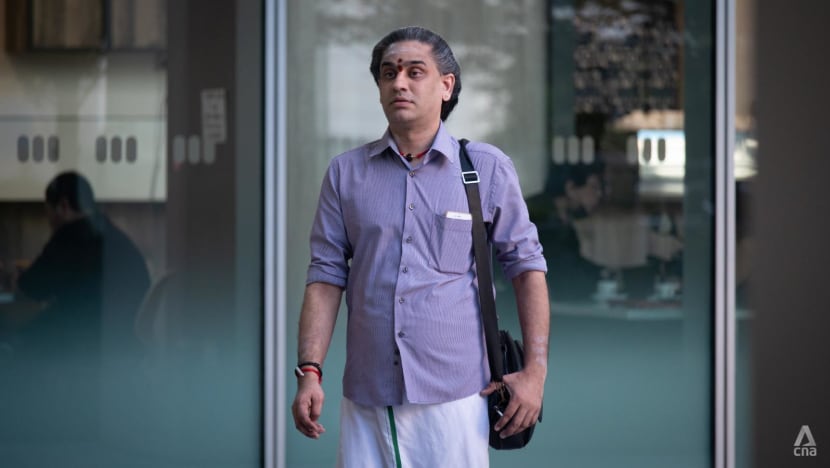Ex-chief priest of Sri Mariamman Temple jailed for repeatedly pawning temple jewellery for over S$2 million
The crimes went undetected for almost five years as Kandasamy Senapathi would return the jewellery before scheduled audits.
Kandasamy Senapathi, ex-chief priest of Sri Mariamman temple, outside the State Courts on May 30, 2023. (Photo: CNA/Syamil Sapari)

Lydia Lam
30 May 2023 11:47AM (Updated: 30 May 2023 12:43PM)
www.channelnewsasia.com
SINGAPORE: Over almost five years, the chief priest of Singapore's oldest Hindu temple misused ceremonial jewellery by pawning them repeatedly - to the tune of over S$2 million (US$1.5 million).
Kandasamy Senapathi, 39, was caught only when the COVID-19 pandemic struck in 2020, throwing the regular audit timing off and revealing the missing jewellery.
Kandasamy was sentenced to six years' jail on Tuesday (May 30) for his crimes.
He pleaded guilty to two charges of criminal breach of trust by dishonest misappropriation and two charges of transferring criminal proceeds out of the country. Another six charges were considered in sentencing.
The court heard that Kandasamy, an Indian national, was employed by the Hindu Endowments Board as a priest at Sri Mariamman Temple from December 2013 until he resigned on Mar 30, 2020.
He first served as the second-in-charge to the temple's chief priest, before being promoted to the role of chief priest in July 2018 when his predecessor retired.
Kandasamy was entrusted with the keys and combination number code to the safe in the temple's holy sanctum sometime in 2014.
The safe contained 255 pieces of gold jewellery owned by the temple, with a book value of about S$1.1 million.
The jewellery was used to adorn Hindu deities during special prayers or temple events, and Kandasamy was tasked with retrieving and returning the jewellery on such occasions.
Kandasamy was the only person with the keys and access to the safe containing the jewellery.
He began pawning pieces of the jewellery in 2016, taking them to pawn shops and later redeeming them by using money he obtained from pawning other pieces of temple jewellery.
In 2016 alone, Kandasamy pawned 66 pieces of gold jewellery from the temple on 172 occasions. He redeemed all the jewellery and returned it back to the temple without anyone knowing.
He continued this practice between 2016 and 2020, rolling the cash and returning the jewellery whenever he knew an audit was scheduled.
His actions went undetected as he was able to borrow enough money to redeem the pawned jewellery before scheduled audits.
Once the audit was completed, he would pawn the jewellery again so he could return the money he had borrowed.
The total amount of cash disbursed to Kandasamy by the pawn shops from 2016 to 2020 was S$2,328,760.
He deposited some of the money into his personal bank account and remitted about S$141,000 to India.
CRIMES UNCOVERED
In March 2020, at the height of the COVID-19 pandemic in Singapore, the temple had to delay an external audit because of the "circuit breaker" measures forbidding non-essential activity in the country.However, a member of the temple's finance team arranged for an audit to be conducted during Phase 2 of the circuit breaker between July 2020 and August 2020.
In June 2020, this staff member was arranging for the audit when Kandasamy told him that he did not have the key to the safe. He said he had likely left the key in India while he was visiting family.
However, the staff member insisted that the audit had to be done, and Kandasamy eventually confessed to him that he had taken the jewellery for pawning.
At the time, 17 pieces of jewellery were with two pawn shops. Kandasamy borrowed about S$521,000 from friends and went with the temple employee to redeem the jewellery.
In the end, all the jewellery was returned to the temple and the temple suffered no loss, said the prosecutor.
The member of the temple's finance team later filed a police report.
Kandasamy then resigned from his post as he felt guilty for pawning the temple's jewellery, added the prosecutor.
She asked for seven years' jail, pointing to the high pawn value of the jewellery involved.
Defence lawyer Mohan Das Naidu asked for about three years' jail instead. He said there was no loss to the temple and his client had kept his word, with the jewellery eventually redeemed even before the temple made a police report.
Mr Naidu said it all started when Kandasamy wanted to help a friend raise funds for cancer, and also to help schools and temples in India.
However, it "got out of hand". The lawyer said what Kandasamy did was wrong, but stressed that there was no loss to the temple as the jewellery was returned.
He said Kandasamy's intention was "never to deprive the temple" of its jewellery, but he was "caught up in this vicious cycle of pawning and redeeming, pawning and redeeming".
"It's a very stupid venture," added the lawyer.
Mr Naidu said Kandasamy's personal benefit was only about S$141,000, the sum he remitted back to India.
However, Deputy Public Prosecutor Janice See said the figure cited did not take into account money that Kandasamy had not deposited into his bank account.
She said it was therefore likely that Kandasamy's monetary benefit was higher than the S$141,000 sum.
Ms See said the offending conduct took place over about five years, and was only revealed by the unprecedented events of the COVID-19 pandemic.
She added that, in this case, the real mischief is not in the fact that he did not lose the jewellery - but that he used temple jewellery that did not belong to him and was in fact for sacred use, in order to generate a side income.
In sentencing, the judge said he could not ignore the fact that the case involved about S$2 million, which is a significant amount and higher than any previous similar cases.



